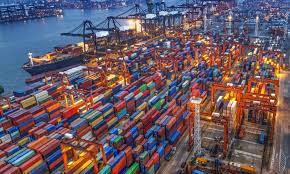Global central bankers have been out and about continuing to promote a narrative that inflation is “transitory.”
We’ve seen it from the likes of Powell, Lagarde, Bailey, and Kuroda. Logically, these monetary wonks are right, inflation caused by supply chain bottlenecks will resolve itself, but these officials have yet to provide a timeline because they don’t know.
For more insight on when global supply chain bottlenecks will subside, Dubai’s DP World, one of the biggest international port operators, Chairman and CEO Sultan Ahmed Bin Sulayem spoke with Bloomberg TV at the Dubai Expo 2020 on Friday and said disruptions could last for another two years.
“The global supply chain was in crisis at the beginning of the pandemic,” Bin Sulayem said. “Maybe in 2023 we’ll see an easing.”
He pointed to skyrocketing container rates and said price increases are due to shortages and the accumulated delays. “Freight rates will continue to increase, and the shipping lines are having an amazing time,” he added.
For some context on DP World’s operations, it manages the Port of Jebel Ali, also known as Mina Jebel Ali, a deep port located in Jebel Ali, Dubai, United Arab Emirates. The port is the world’s ninth busiest port.
The world’s largest shipping line, A.P. Moller-Maersk, recently warned bottlenecks might last longer than expected, and some shippers have pledged to cap spot rates. DHL and UPS have also warned supply chain disorder will not only persist into next year but could leave a permanent scar.
Before global supply chains splinter further and lead to more shortages worldwide, the question is: How can supply-chain bottlenecks be resolved?
Since the crisis was created by surging demand putting strain on container capacity, suppliers, and logistics companies as they struggled to deliver goods. The easiest way to break this vicious cycle is for consumer demand growth to wane. That solution is something countries aren’t willing to embark on because it will disrupt their economic recoveries from the virus pandemic lows.
Mohamed El-Erian, former PIMCO CEO and chief economic adviser at Allianz, also see these disruptions “will be with us for a while,” prompting producer pries to continue soaring around the world that eventually push up consumer prices.
El-Erian warns supply-side troubles could last for one to two years, if not more, which translates into stagflationary winds for the global economy unfamiliar to those who did not live through the 1970s.
While industry leaders continue to warn about continued supply chain woes, central bankers live in an alternative world of denial that will ultimately crush any credibility they have left.
